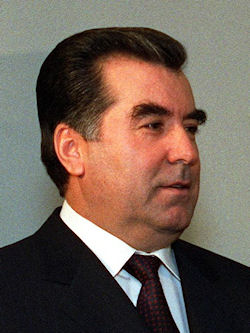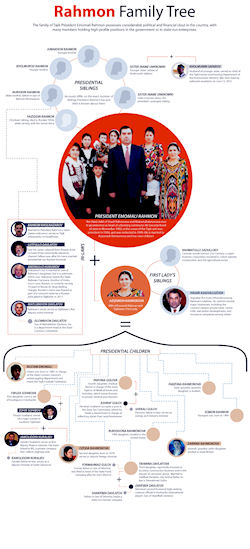Tajikistan - Emomali Rahmon / Imomali Rahmonov
 President Rahmon [aka Imomali Rahmonov] is a clever politician who has learned to resolve conflicts between factions and prevented serious challenges to his rule. However, he has charted an unstable future for his country through economic mismanagement and a short-sighted religious policy. Despite the country's immense economic hardships, Rahmon has proven to be an agile political operator. He has learned how to resolve conflicts between political factions, and he has prevented anyone emerging to seriously challenge his hold on power. When conflicts arise, he is patient, waits for factions to show themselves, and then negotiates with them. Rahmon has no serious rivals and it is difficult to envision change in the current environment.
President Rahmon [aka Imomali Rahmonov] is a clever politician who has learned to resolve conflicts between factions and prevented serious challenges to his rule. However, he has charted an unstable future for his country through economic mismanagement and a short-sighted religious policy. Despite the country's immense economic hardships, Rahmon has proven to be an agile political operator. He has learned how to resolve conflicts between political factions, and he has prevented anyone emerging to seriously challenge his hold on power. When conflicts arise, he is patient, waits for factions to show themselves, and then negotiates with them. Rahmon has no serious rivals and it is difficult to envision change in the current environment.
President Rahmon surrounded himself with those who do not have presidential ambitions. Rahmon dismissed Hoji Akbar Turajonzoda in 2005 because he had become very popular; Rahmon appointed him to parliament when he was able to convince Rahmon that he had no intention of running for president in 2006. Rahmon was content to keep the current Prime Minister, Oqil Oqilov, in his position - despite the fact that he has reached retirement age because he does not have his eyes on the presidency. Rahmon did not have to worry about attacks from the opposition. The strongest opposition party, the Islamic Revival Party, did not attack his Achilles heels - a bad economy and recurring winter crises.
All of Tajikistan's senior economic officials and advisors were Soviet-era thinkers who could not manage a transition to a modern economy. In Uzbekistan, Kyrgyzstan and Kazakhstan, younger officials had been brought in to introduce new ideas and methods to the economy. Rahmon, however, was reluctant to bring in new blood; it was hard to find a pragmatic business-minded figure who had no political ambitions.
Rahmon is a young man by Central Asian standards. Emomali Rahmon [Rahmonov] was born to a peasant family on October 5, 1952 in Dangara district of the Republic of Tajikistan. Emomali Rahmon began his labor activity in 1969 after graduation from Technical Lyceum ?40 of Kalininabad city (presently Sarband) electrician at Qurghonteppa oil factory. From 1971 to 1974 he served in the Pacific Navy Military Force. After the demobilization, he started working at the Lenin collective farm in Dangara. Emomali Rahmon graduated from the Faculty of Economics at the Tajik National University in 1982.
From 1976 to 1987 he held posts of the secretary of direction and the Chairman of the Union Committee of the Lenin collective farm in Dangara. He later worked in party bodies. From 1987 to 1992 he was the Chairman of the Lenin collective farm in Dangara. In 1990, Emomali Rahmon was elected as People’s Deputy at the Supreme Council of the Republic of Tajikistan of twelfth convocation. In autumn 1992, he was elected as the Chairman of the Executive Committee of the Council of the People’s Deputies of Kulyab province.
On November 19, 1992 at the XVI session Emomali Rahmon was elected as the Chairman of the Supreme Council of the Republic of Tajikistan. On November 6, 1994, Emomali Rahmon was elected to the post of the President of the Republic of Tajikistan by nation-wide voting.
Rahmonov's control over the judiciary was demonstrated in June 1993 when the Supreme Court banned all four opposition parties and all organizations connected with the 1992 coalition government. The ban was rationalized on the basis of an accusation of the parties' complicity in attempting a violent overthrow of the government. The president appoints judges with legislative approval but has the ability to unilaterally remove them.
Tajikistan also ratified a new constitution in 1994 that called for a unicameral, 181-seat parliament to replace the Supreme Soviet. In the first election under those guidelines, 161 deputies were chosen in February 1995 and nineteen of the remaining twenty in a second round one month later. In the 1995 parliamentary election, an estimated forty seats were uncontested, and many candidates reportedly were former Soviet regional and local officials. The sixty communist deputies who were elected gave Rahmonov solid support in the legislative branch because the majority of deputies had no declared party affiliation. Like the 1994 presidential election, the parliamentary election was not considered free or fair by international authorities.
Further constitutional amendments in 1999 made the Supreme Assembly bicameral, consisting of a 34-seat upper house called the National Assembly and a 63-seat lower chamber called the Assembly of Representatives. All serve five-year terms, though only the members of the Assembly of Representatives are popularly elected; seats in the National Assembly are assigned by the president or by local deputies.
In June 2003, the people of Tajikistan voted in a constitutional referendum to allow president Rahmonov to run for a further two consecutive seven-year terms when his then-current one ended in 2006. The authorities put turnout at over 96% and the vote in favor at about 93%. There were only a couple of dozen international observers to monitor the referendum at all 2,800 polling stations. The next presidential election will be in November 2013.
The proposal to extend the president's term was included amongst dozens of other constitutional amendments which were voted on as a single package. The opposition asserted that people were very poorly informed about what was really at stake.
The strength of Rahmonov's influence was highlighted again when his People's Democratic Party won virtually all 63 seats in the lower house of parliament in the February 2005 general elections. The opposition Islamic and Communist parties won just a handful between them. Western observers said that the vote failed to meet international standards.
At the December 26, 2009 pre-election congress of the People's Democratic Party of Tajikistan (PDPT), which dominates both houses of the Tajik Parliament (Majlisi Oli), President Rahmon won unanimous re-election as PDPT chairman and installed his son on the party's central committee. He dismissed all three PDPT deputy chairmen, including powerful Dushanbe Mayor Mahmadsayid Ubaidulloyev, and appointed Dangara-connected cronies as his new party deputies.
 Rahmon's rivalry with the Dushanbe Mayor, Makhmadsaid Ubaidulloev indicates two circles of power do not intersect; each has carved out its fiefdom. It is curious that President Rahmon has been unable to unseat Ubaidulloev from either of his powerful positions - Mayor of Dushanbe or Speaker of the upper house of Parliament.
Rahmon's rivalry with the Dushanbe Mayor, Makhmadsaid Ubaidulloev indicates two circles of power do not intersect; each has carved out its fiefdom. It is curious that President Rahmon has been unable to unseat Ubaidulloev from either of his powerful positions - Mayor of Dushanbe or Speaker of the upper house of Parliament.
President Rahmon's inner circle is so small that very few people fully understood the dynamics of the Rahmon family relationships. There appears to be a rivalry between President Rahmon's children, especially his daughter Tahmina, and his brother in law, Hasan Asadullzoda. This rivalry manifested itself in early May 2008, when rumors spread that President Rahmon's son, Rustam, reportedly shot Asadullzoda. While Asadullzoda is sometimes identified as a pragmatic influence in President Rahmon's administration, Asadullzoda's primary aim is to control everything for himself. Popular discontent fuels speculation and rumor about these "insiders." The Rumors that President Rahmon's son, Rustam, shot and killed Asadullzoda persisted weeks after the alleged event, despite the fact that Asadullzoda had been seen numerous times in public and has met with diplomats. Separating fact from fiction, or from wishful thinking, can be difficult.
Confident in his internal political position and generally popular in his regional strongholds, including Dushanbe, Rahmon believes he can safely marginalize Ubaidulloyev in the party without splitting his Kulobi base. The appointment of Rahmon's son, Rustam, to the PDPT central committee follows a pattern of nepotistic appointments to high level positions; Rahmon's daughter Ozoda was appointed Deputy Foreign Minister.
The President appointed his 22-year-old son, Rustam Emomali, to the party's 67-member executive committee. The young Rustam already holds two posts: Deputy Head of the Youth Association of Tajikistan and Chief of the Department to Support Medium and Small Enterprises in the State Committee on Property and Investments. He has participated in high-level state negotiations unrelated to his current responsibilities. He gained notoriety in May 2008, when he reportedly shot his uncle, the powerful business magnate Hasan Asadullozoda, during a murky domestic squabble. It appeared that Rustam, at 22, was being groomed as Rahmon's successor; already he is playing an increasingly public role in the government.
|
NEWSLETTER
|
| Join the GlobalSecurity.org mailing list |
|
|
|

